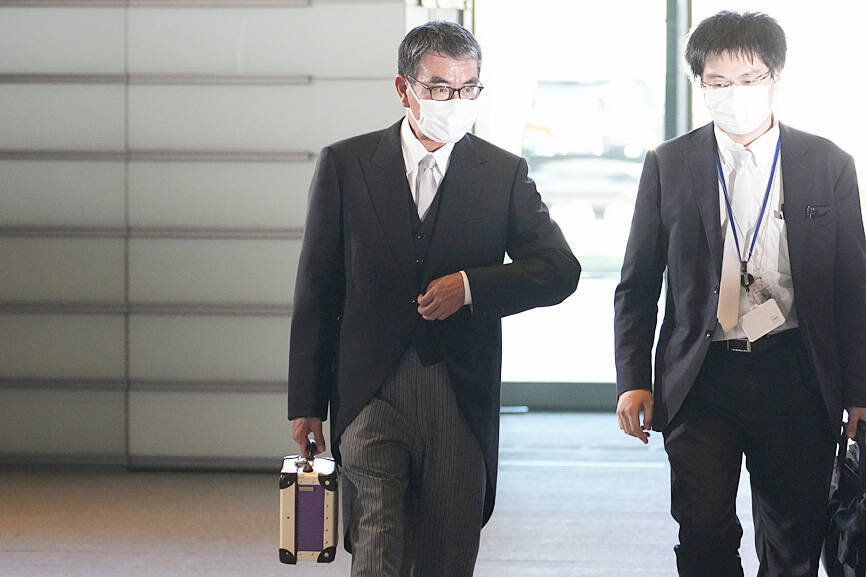Japanese Minister of Digital Affairs Taro Kono has declared “war” on a technology many have not seen for decades — the floppy disk.
The hand-sized, square-shaped data storage item, along with similar devices including the CD or even lesser-known mini disk, are still required for some 1,900 government procedures and must go, Kono wrote on Twitter yesterday.
He previously vowed to rid Japan’s bureaucracy of outdated tools from the hanko stamp to the fax machine.

Photo: AP
“We will be reviewing these practices swiftly,” Kono told a news conference on Tuesday, adding that Japanese Prime Minister Fumio Kishida has offered his full support.
“Where does one even buy a floppy disk these days?” Kono asked.
Japan is not the only nation that has struggled to phase out the outdated technology — the US Department of Defense only in 2019 announced that it has ended the use of floppy disks, which were first developed in the 1960s, in a control system for its nuclear arsenal.
Sony stopped making the disks in 2011, and many young people would struggle to describe how to use one or even identify one in the modern workplace.
Legal hurdles are making it difficult to adopt modern technology such as cloud storage for wider use within the bureaucracy, according to a presentation by the country’s digital task force dated Tuesday.
The group is to review the provisions and plans to announce ways to improve them by the end of the year.
Kono, one of the ruling Liberal Democratic Party’s most visible politicians, who is often cited by voters as a contender to be prime minister, has been an outspoken critic of bureaucratic inefficiencies due to archaic practices, most notably the fax machine and the hanko, a unique, carved red stamp that remains necessary to sign off on official documents such as a marriage license.
He tried to curb use of both when he was administrative reform minister between 2020 and last year, but the two are still widely used.
“I’m looking to get rid of the fax machine, and I still plan to do that,” Kono said on Tuesday.

South Korea would soon no longer be one of the few countries where Google Maps does not work properly, after its security-conscious government reversed a two-decade stance to approve the export of high-precision map data to overseas servers. The approval was made “on the condition that strict security requirements are met,” the South Korean Ministry of Land, Infrastructure and Transport said. Those conditions include blurring military and other sensitive security-related facilities, as well as restricting longitude and latitude coordinates for South Korean territory on products such as Google Maps and Google Earth, it said. The decision is expected to hurt Naver and Kakao

MONEY GRAB: People were rushing to collect bills scattered on the ground after the plane transporting money crashed, which an official said hindered rescue efforts A cargo plane carrying money on Friday crashed near Bolivia’s capital, damaging about a dozen vehicles on highway, scattering bills on the ground and leaving at least 15 people dead and others injured, an official said. Bolivian Minister of Defense Marcelo Salinas said the Hercules C-130 plane was transporting newly printed Bolivian currency when it “landed and veered off the runway” at an airport in El Alto, a city adjacent to La Paz, before ending up in a nearby field. Firefighters managed to put out the flames that engulfed the aircraft. Fire chief Pavel Tovar said at least 15 people died, but

THE TRAGEDY OF PUNCH: Footage of the seven-month-old Japanese macaque has gone viral online after he was rejected by his mother and formed a bond with a soft toy A baby monkey in Japan has captured hearts around the world after videos of him being bullied by other monkeys and rejected by his mother went viral last week. Punch, a Japanese macaque, was born in July last year at Ichikawa City Zoo. He has drawn international attention after zookeepers gave him a stuffed orangutan toy after he was abandoned by his mother. Without maternal guidance to help him integrate, Punch has turned to the toy for comfort. He has been filmed multiple times being dragged and chased by older Japanese macaques inside the enclosure. Early clips showed him wandering alone with

Australian Prime Minister Anthony Albanese yesterday said he did not take his security for granted, after he was evacuated from his residence for several hours following a bomb threat sent to a Chinese dance group. Albanese was evacuated from his Canberra residence late on Tuesday following the threat, and returned a few hours later after nothing suspicious was found. The bomb scare was among several e-mails threatening Albanese sent to a representative of Shen Yun, a classical Chinese dance troupe banned in China that is due to perform in Australia this month, a spokesperson for the group said in a statement. The e-mail